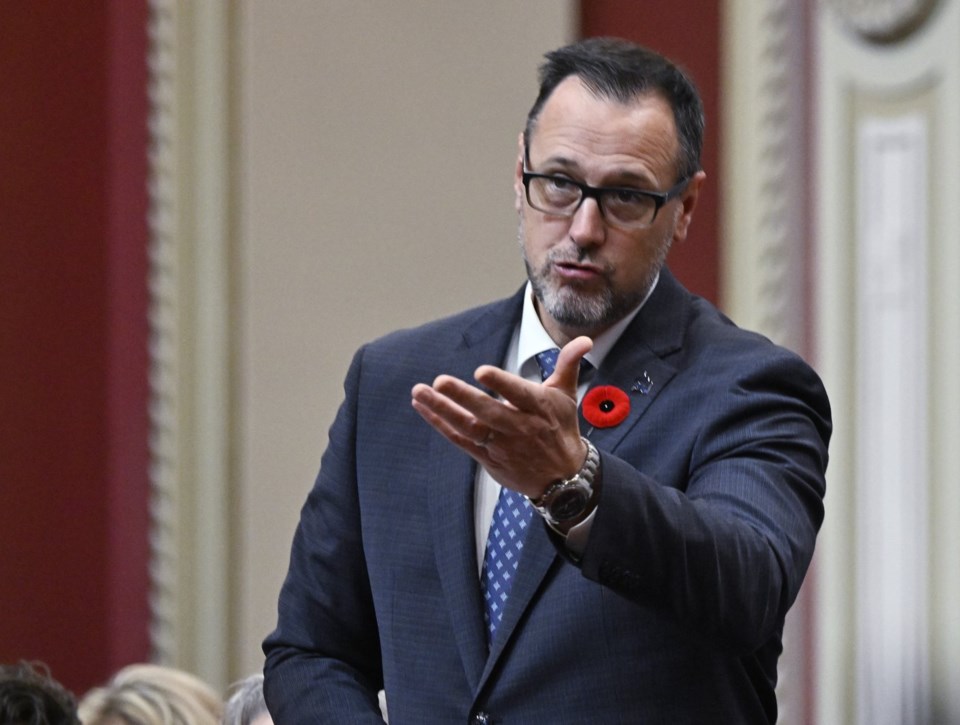MONTREAL ŌĆö Public post-secondary institutions in Quebec say they should be exempt from the government's plan to cut international students, claiming it could hurt their ability to attract top talent, but the immigration minister shows no sign of backing down.
Jean-Fran├¦ois Roberge said Tuesday itŌĆÖs ŌĆ£not reasonableŌĆØ to think the government could reduce the number of foreign students in Quebec without including universities and public colleges, known as C├ēGEPs. Last month, Roberge tabled legislation that would give the government broad discretion to cap foreign student enrolment at Quebec schools based on region, institution and program of study.
Universities and C├ēGEPs say the Quebec government has encouraged them to recruit more international students in recent years, especially from French-speaking countries, only to do an about-face as part of its effort to stem the flow of non-permanent residents.
They say the government should leave them alone and instead target institutions that might be abusing the system. When Roberge announced the bill, he said some private colleges were using education as ŌĆ£a business model to sell Quebec and Canadian citizenship."
But on Tuesday, Roberge made clear the bill isn't just about tackling abuse. "We know we want to reduce the number of students and do it well," he told reporters in Quebec City. "To think we could do all that without the C├ēGEPs and universities being part of the equation, I think that's not reasonable."
A legislative committee studying the bill heard Tuesday from universities and C├ēGEPs that say the proposed law threatens their autonomy. Pierre Cossette, rector of Universit├® de Sherbrooke, said international students at Quebec universities are an asset to the province.
"If there is a problem to solve ŌĆ” we have to find the right illness and avoid medications that have lots of side effects," he said. Roberge's bill, Cossette said, "doesn't target the right illness and has many side effects."
In documents delivered to the committee, the schools point to Quebec government policies that have encouraged the recruitment of international students in recent years. A 2023 strategic plan from QuebecŌĆÖs Higher Education Department says that attracting international students to francophone colleges and universities is ŌĆ£a government priority."
In a brief, Concordia University says international students bring in $520 million in annual revenue for Quebec universities, an "essential" source of funding. "A significant drop in the number of international students would represent a 180-degree turn away from past and current university funding policies," it says.
On Tuesday, Roberge said that attracting francophone international students remains important, but the system needs to be better managed. ŌĆ£It's not normal for migration policy, when we're talking about foreign students, to be put in the hands of 20, 40, 70 institutions, all independent," he said. "It needs a conductor.ŌĆØ
Concordia, one of Quebec's three English-language universities, is also against a government-imposed foreign student cap based on language. The bill doesn't explicitly mention language, but Roberge has said one goal of the legislation is to protect French, and the government could take language of study into account when determining quotas.
Benoît Dubreuil, Quebec's French language commissioner, appeared before the committee Tuesday in support of the legislation. He encouraged the government to explicitly include language in the bill as a factor to be considered.
Concordia and McGill University attract the highest numbers of international students in the province. Still, their numbers have stayed static since 2018, while the number of foreign students at francophone universities has continued to climb.
McGill released its 2024 enrolment numbers on Tuesday, which show the university now has 11,560 international students, compared to 11,909 last year. Overall admissions are up slightly from last year, but McGill is reporting a drop in applications, from 41,000 in 2023 to fewer than 38,000 this year.
The anglophone universities say they've been hit hard by the Quebec government's decision to hike tuition for out-of-province students this year by $3,000, which it also billed as an effort to protect the French language.
Roberge's bill is part of a larger attempt to reduce the number of non-permanent residents in Quebec, which currently sits around 600,000. Premier Fran├¦ois Legault has said that temporary immigrants are entirely responsible for the province's housing crisis.
Foreign students account for about 124,000 of that total, which Roberge says is a 140 per cent increase in the last decade. The universities say they currently host 57,000 international students. According to the federation of C├ēGEPs, there were nearly 9,000 foreign students in public colleges last year.
Meanwhile, some government-subsidized private colleges have seen sharp increases in foreign students in recent years. But the province's network of non-subsidized private colleges has seen its foreign student population drop by 90 per cent since 2020, after the government stepped in to stop an influx of Indian students that had raised red flags. Last year, private colleges accounted for fewer than 6,000 of the international students in Quebec.
This report by The Canadian Press was first published Nov. 5, 2024.
ŌĆö With files from Thomas Laberge in Quebec City
Maura Forrest, The Canadian Press



